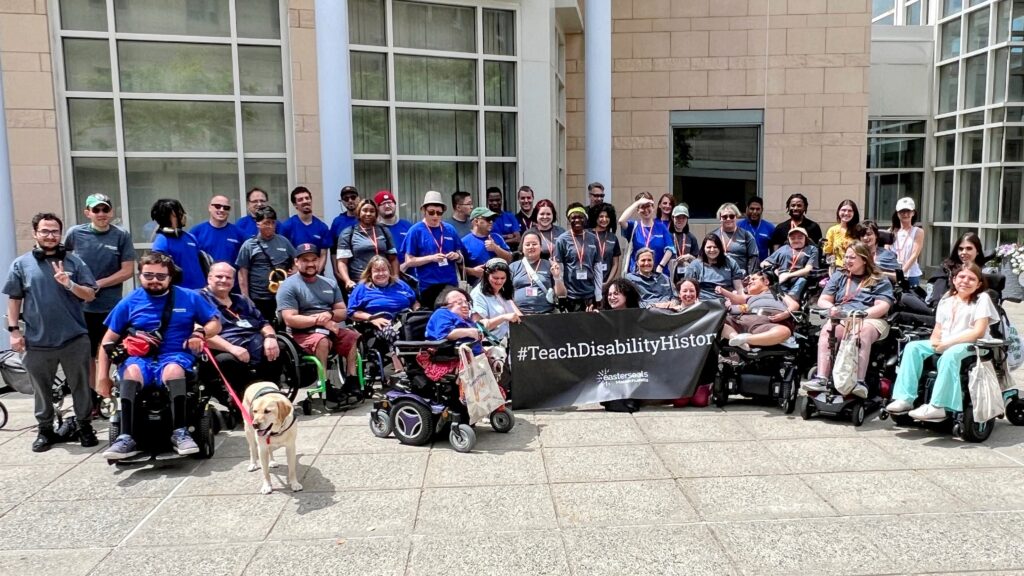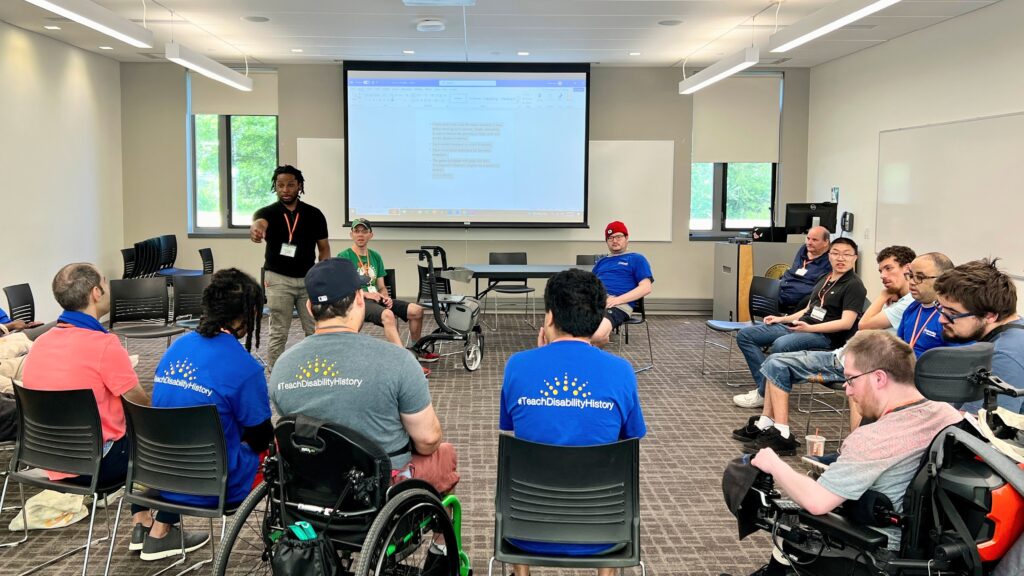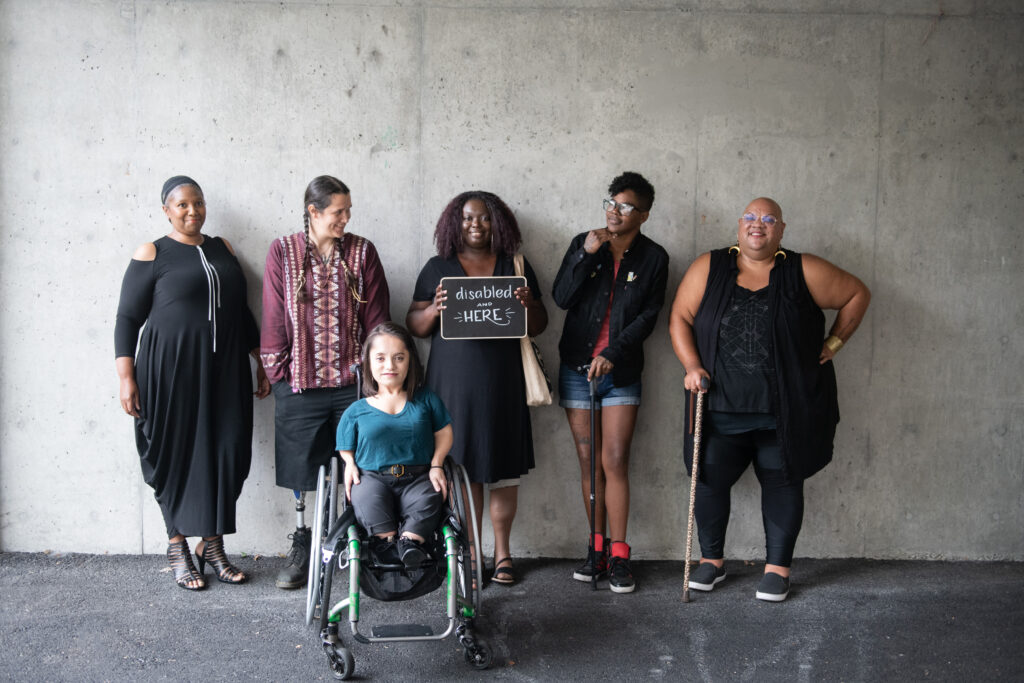
Legislative Landmarks
Easterseals has been active in public policy advocacy since our founder, Edgar Allen, lobbied the Ohio Legislature to fund appropriate services for children with disabilities in the 1920s. We have worked with federal, state and local officials and agencies since then to advocate for laws and programs that help people with disabilities achieve independence. Children and adults with disabilities disproportionately rely on government programs in order to access education, health care, housing, transportation and employment services.
Easterseals continues to actively support and promote federal legislation that helps people with disabilities achieve independence.
2016 - The Older Americans Act Reauthorization Act is a critical piece of legislation that reauthorizes supportive services for older adults through Area Agencies on Aging, family caregiver supports, nutrition programs, transportation services, and the Senior Community Service Employment Programs (SCSEP).
2014 - The Achieving a Better Life Experience (ABLE) Act creates tax-free savings accounts to help many families with children with significant disabilities to save for that child's future living expenses without jeopardizing their government benefits.
2014 - The Workforce Innovation and Opportunity Act updates the U.S. job training and employment system, including the vocational rehabilitation program and other employment services for people with disabilities.
2010 - Patient Protection and Affordable Care Act and reconciliation measure enacted. This historic effort to reform the nation's health care system makes insurance coverage available for an additional 32 million Americans.
2010 - “Rosa’s Law” will replace usage of the term "mental retardation" in federal statutes and programs with the more appropriate "intellectual disability." This change is designed to support the dignity of people with intellectual disabilities who have been stigmatized by the term “mental retardation.”
2010 - Signed into law on October 8, the Twenty-First Century Communications and Video Accessibility Act greatly increases access to telecommunications for people with disabilities through expanded relay operator usage, access to advanced telecommunications equipment, and increased closed captioning and video description services.
2009 - State Children’s Health Insurance Program (SCHIP) Reauthorization for 4.5 years and provide coverage to approximately 4 million additional children.
2008 - The ADA Amendments Act, legislation to restore the intended coverage of the Americans with Disabilities Act prohibiting discrimination against people with disabilities and providing millions of Americans the chance to participate fully in life.
2006 - The Lifespan Respite Care Act was signed into law to ensure that community-based respite care services were more accessible and affordable to family caregivers, regardless of the care recipient's or caregiver's age or disability.
2004 - Individuals with Disabilities Education Act (IDEA) reauthorized and amended to ensure improved educational services to students with disabilities.
2000 - Developmental Disabilities Assistance and Bill of Rights Act of 2000 enhances the Developmental Disabilities Councils, Protection and Advocacy Systems, University Affiliated Programs, and Projects of National Significance. The revised law includes a provision authored by Easterseals and the American Association of University Affiliated Programs that creates training programs for early childhood education personnel that must be conducted in collaboration with programs such as Easterseals Child Development Centers.
2000 - Older Americans Act Amendments include a new National Family Caregiver Support Program, which provides funding to state and area agencies on aging, and other organizations they contract with, to provide systems of support services to family caregivers. The reauthorized OAA also includes includes an innovation grant program to provide competitive grants to foster the development and testing of new approaches to sustaining the efforts of families and other informal caregivers of older individuals.
1999 - Ticket to Work and Work Incentives Improvement Act of 1999 removes barriers that have required people with disabilities to choose between health care coverage and work.The law also increases consumer choice in obtaining rehabilitation and vocational services through the establishment of a Ticket to Work and Self-Sufficiency program.
1998 - The Assistive Technology Act of 1998 continues federal funding for states to improve and expand access to assistive technology devices and services for people with disabilities.
1997 - Individuals with Disabilities Education Act Amendments of 1997 reauthorized the IDEA to strengthen and improve education programs and services for children with disabilities.
1997 - State Children’s Health Insurance Program (SCHIP) enacted to allow the states, with support from the federal government, to design insurance programs for children of working families who earn too much to qualify for Medicaid, but may not be able to purchase health care insurance on their own.
1996 - Health Insurance Portability and Accountability Act of 1996 improves access to health care for 25 million Americans by guaranteeing that private health insurance is available, portable, and renewable; limiting pre-existing condition exclusions; and, increasing the purchasing clout of individuals and small employers through incentives to form private, voluntary coalitions to negotiate with providers and health plans.
1996 - Child Abuse Prevention and Treatment Act (CAPTA) Amendments of 1995 includes a new family resource and support program that supports state efforts to develop, operate, expand and enhance a network of community-based, prevention-focused, family resource and support programs which would be equipped to address, among other things, the additional family support needs of families with children with disabilities.
1996 - The Developmental Disabilities Assistance and Bill of Rights Act Amendments enhance Developmental Disabilities Councils, Protection and Advocacy Systems, University Affiliated Programs, and Projects of National Significance.
1996 - Telecommunications Act of 1996 ensures equal access to telecommunications for people with disabilities.
1996 - Fiscal Year 1997 Department of Veteran's Affairs and Housing and Urban Development Appropriations includes a provision to initiate Veterans benefits for the children of Vietnam-era who were born with spina bifida as a result of their parents' exposure to Agent Orange. Also includes provision that prohibits insurance companies from having lower lifetime caps for treatment of mental illness versus other disabilities.
1994 - Technology-Related Assistance for Individuals with Disabilities Act reauthorized the 1988 "Tech Act," which was established to develop consumer-driven, statewide service delivery systems that increase access to assistive technology devices and services to individuals of all ages with disabilities. The 1994 amendments emphasize advocacy, systems changes activities and consumer involvement.
1993 - Elementary and Secondary Education Amendments of 1993 reauthorized the Elementary and Secondary Education Act (ESEA). The ESEA provides the framework of federal grants to states for elementary and secondary education programs. Among other provisions, the 1994 amendments include a provision sponsored by Senator Tom Harkin (D-Iowa) to establish statewide systems of support for families of children with disabilities.
1993 - Fiscal Year 1994 Treasury, Postal Service, General Government Appropriations includes an amendment to establish a new formula for non-profit rate setting, under which third class non-profit rates will increase four percent per year for the next six years.
1993 - National and Community Service Trust Act of 1993 established a national service program, including tuition assistance and a living allowance for individuals age 17 and older who volunteer part-time or full-time in community service programs.
1993 - National Voter Registration Act requires states to liberalize their voter registration rules to allow people to register to vote by mail, when they apply for driver's licenses or at offices that provide public assistance.
1992 - The Rehabilitation Act Amendments include changes intended to increase access to state vocational rehabilitation systems, to enable consumers to have greater control in the rehabilitation process, and to provide opportunities for career advancement.
1992 - The Older Americans Act Amendments The Older Americans Act authorizes a variety of programs and support services, including those administered by state and area agencies on aging, for the nation's elderly.
1991 - Individuals with Disabilities Education Act of 1991 enhances infants and toddlers program and extends the IDEA support programs.
1990 - The Individuals with Disabilities Education Act Amendments (IDEA) reauthorize programs under the Education of the Handicapped Act to improve support services to students with disabilities, especially in the areas of transition and assistive technology.
1990 - The Americans with Disabilities Act (ADA) guarantees the civil rights of people with disabilities by prohibiting the discrimination against anyone who has a mental or physical disability in the area of employment, public services, transportation, public accommodations, and telecommunications.
1990 - The Television Decoder Circuitry Act requires closed caption decoders to be part of all televisions with screens 13 inches and larger.
1989 - The Job Training and Basic Skills Act revises Title II of the Job Training Partnership Act (JTPA), which improves services to economically disadvantaged adults and youths facing barriers to employment and recognizes disability as being a barrier to employment.
1988 - The Fair Housing Act Amendments add persons with disabilities as a group protected from discrimination in housing and ensure that persons with disabilities are allowed to adapt their dwelling place to meet their needs.
1988 - The Civil Rights Restoration Act amends the Rehabilitation Act's definition of an individual with a disability and defines coverage of Section 504 as broad (e.g., extending to an entire university) rather than narrow (e.g., extending to just one department of the university) when federal funds are involved.
1988 - Temporary Child Care for Children with Disabilities and Crisis Nurseries Act established grants for respite services and crisis nurseries.
1988 - The Technology-Related Assistance for Individuals with Disabilities Act provides grants to states to develop statewide assistive technology programs.
1988 - Protection and Advocacy for Mentally Ill Individuals Amendments Act of 1988 extends protection and advocacy services to individuals with mental illness.
1986 - The Education of the Handicapped Act Amendments amends the act to include grants for states to develop an early intervention system for infants and toddlers with disabilities and to establish a preschool program for children with disabilities between the ages of 3 and 5 years.
1986 - The Handicapped Children's Protection Act allows the award of reasonable attorneys fees to parents who prevail in due process proceedings under the Education of the Handicapped Act.
1986 - The Air Carrier Access Act prohibits discrimination against persons with disabilities by all air carriers and provides for enforcement under the U.S. Department of Transportation.
1984 - The Voting Accessibility for the Elderly and Handicapped Act requires that registration and polling places for federal elections be accessible to persons with disabilities.
1980 - The Civil Rights of Institutionalized Persons Act authorizes the U.S. Department of Justice to sue states for alleged violations of the rights of institutionalized persons.
1978 - The Rehabilitation and Developmental Disabilities Amendments establish the National Institute of Handicapped Research and new programs for people with disabilities, including comprehensive service centers, independent living projects, recreation programs, and pilot programs for employment.
1975 - The Education for All Handicapped Children Act mandates a free, appropriate public education for all children with disabilities.
1975 - The Developmental Disabilities Assistance and Bill of Rights Act funds services for persons with developmental or severe long-term disabilities and establishes a system of protection and advocacy organizations in each state.
1973 - The Rehabilitation Act prohibits discrimination against otherwise qualified persons with disabilities in any program or activity receiving federal funds and in executive agencies and the Postal Service.
1968 - The Architectural Barriers Act requires all buildings constructed, altered, or financed by the federal government after 1969 to be accessible and usable by persons with physical disabilities.




 “One of the strongest positive outcomes we always see, is that because this was an overnight event, we were able to support [Personal Care Assistant] needs if that’s something participants need to be involved,” she said. “[We also provide] other needs they may have that may be a barrier for them to participate in other overnight events. Just getting a chance to be overnight, away from their everyday environment, is always a strong part of this program.”
“One of the strongest positive outcomes we always see, is that because this was an overnight event, we were able to support [Personal Care Assistant] needs if that’s something participants need to be involved,” she said. “[We also provide] other needs they may have that may be a barrier for them to participate in other overnight events. Just getting a chance to be overnight, away from their everyday environment, is always a strong part of this program.”
 When I was a young adult, my family and I would go to medical conventions to learn new information and technologies that could help accommodate my needs while living with short gut syndrome. Short gut syndrome is so rare that these conventions were the only way that I ever got to see or meet other people who lived a similar experience to my own. I felt included, accepted and understood more there than anywhere else. Meeting all these young people like me who had the same challenges, the same desires, same hopes made me see that it was all possible if I was allowed to exist without the constraints and limitations put on me.
When I was a young adult, my family and I would go to medical conventions to learn new information and technologies that could help accommodate my needs while living with short gut syndrome. Short gut syndrome is so rare that these conventions were the only way that I ever got to see or meet other people who lived a similar experience to my own. I felt included, accepted and understood more there than anywhere else. Meeting all these young people like me who had the same challenges, the same desires, same hopes made me see that it was all possible if I was allowed to exist without the constraints and limitations put on me. 




Connect with us on social media